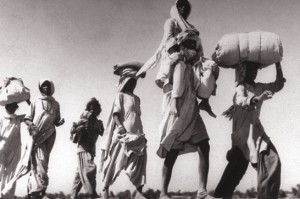|
Flashback
Under the Same Sky (Part-2)
Borders of the
Conscience
Perveen Ahmad
 |
Exodus after partition.
Source: News.bbc.co.uk |
To live in the subcontinent and belong to a world civilisation has stirred me ever since my senses were sharpened. The awareness came early, before my teens, and the reason could well be because of the historic times I was living through. India was in flux after a lengthy time span following the Muslim entry in the 9th century, through the Turk and Persian Sultanates, the consolidation and decline of the Moghul dynsties ending around the 19th century and the hegemony of the British. The indigenous rulers of the subcontinent had succumbed to the new British ruling class albeit reluctantly, with typical Indian resignation. It was to the credit of the Muslim rulers that they became 'Indian' over nine hundred years. The culture of the Moghuls became but another strand in India's great absorbing culture. The British chose to be colonists and worked hard to make Indian sahibs out of the administrative and military cadres who were to serve their interests. Had they not chosen this colonising and patronising attitude they may have lasted more than the hundred and ninety years they ruled! But of course that was only one reason for the end of British rule. The winds of war blowing over Europe fanned and ignited the spirit of the downtrodden in Asia and Far East. That's when I got caught up in the storm of my country's identity.
But even as circumstances alerted us to consciously think, act and swell the tumultuous waves of Indian Nationalism and Indian freedom, the cry for self-rule was the need of the times.
From 1937 to 1947 I was drawn into the upheaval that culminated in India's independence after almost a millennia. Had Pakistan not been destined to come into being, and had the hearts and minds of sub continentals not been shredded by selfish politics, we may, perhaps, be walking common on the land of our common ancestors, of a thousand years ago. The sky by God's grace is indivisible. It is the same sky. I looked upon the sunset of the British Raj and the crystalisation of nationhood that gave communities of India a chance to rediscover and re-identify themselves, after almost two hundred years of colonial domination as a lucky chance.
I contemplate my life, the years I have lived in the subcontinent, with its good and bad, its sun and shade, its snows and deserts, its rivers and mountains, its people of many shades and colours, languages and music, bound by their universal belief in religious teaching, of what ever manifestation. No matter where I have lived and sojourned in this vast landscape I have never felt alien.
 |
The painful journey to a new and uncertain home.
Source: wanabehuman.blogspot.com |
Nationality papers, issued twice in my lifetime, once when my parents opted for Pakistan and secondly when I opted to move to Bangladesh, where conveniences to facilitate our move to start a new life. Indeed I was leaving home, but I was also going home. After the Partition, with my parents, I had a Pakistani passport which I surrendered years later, replacing it with my Bangladeshi nationality in 1971. These essential documents indicated where I chose to live and where I wished to belong, as a sub-continental, traversing the vast fabric of a great region I knew and recognised. I was under the same sky. I had criss-crossed borders of times, when the subcontinent reshaped its physical boundaries, but in my heart and mind I 'belonged' wherever I chose to stay.
Pre partition and post partition events set the scene for those of us who moved by choice in 1948, for those who stayed on, and for those who were driven out by circumstances. Looked at from any angle it was not what we had expected with the departure of the British.
Witnessing the phenomenon of political upheavals, bifurcation of lands, surgically cutting farmlands and cities, separating families, the horrendous refugee movement and manipulating of rivers as political tools, stunned and traumatised my generation. It was ruthless politics, tempered neither by justice nor humaneness. It was blind, partisan, cruel.
Till now the shaping of the sub-continental being that I was, had its roots in the very fact that Indian-ness was the norm. People lived in proximity to people from different provinces, who spoke in a language that was not quite understandable to the other, although efforts were made to communicate, who wore different types of clothes, ate different kinds of foods and worshipped differently. But every one was Indian. I sometimes have pondered whether it is a disadvantage to be a synthesis of several cultures, in contrast to being a person coloured in just one colour. As I grew up and travelled and saw the world I become happy with my fate. I was an adjustable and open-minded person. I did not suffer from parochial complexes and I enjoyed the 'strangeness' of other communities with an open heart.
When the Partition shook up our lives and conflicts buffeted us to take sides, it was painful and traumatic for my parents and us. How does it feel to change nationality and obtain a new passport? How does one declare that one is no longer Indian, that we were now Pakistani and once again years later Bangladeshi? How does one measure one's loyalty, to stop where the borders stop? How much does it take to detach one's patriotism from one's known roots and swear patriotism to the newly chosen boundary of one's new country?
Parveen Ahmad is Vice President, Women for Women Research and Study Group and founder member of Karika, the first handicraft federation in Bangladesh .Copyright
(R) thedailystar.net 2008 |
|
